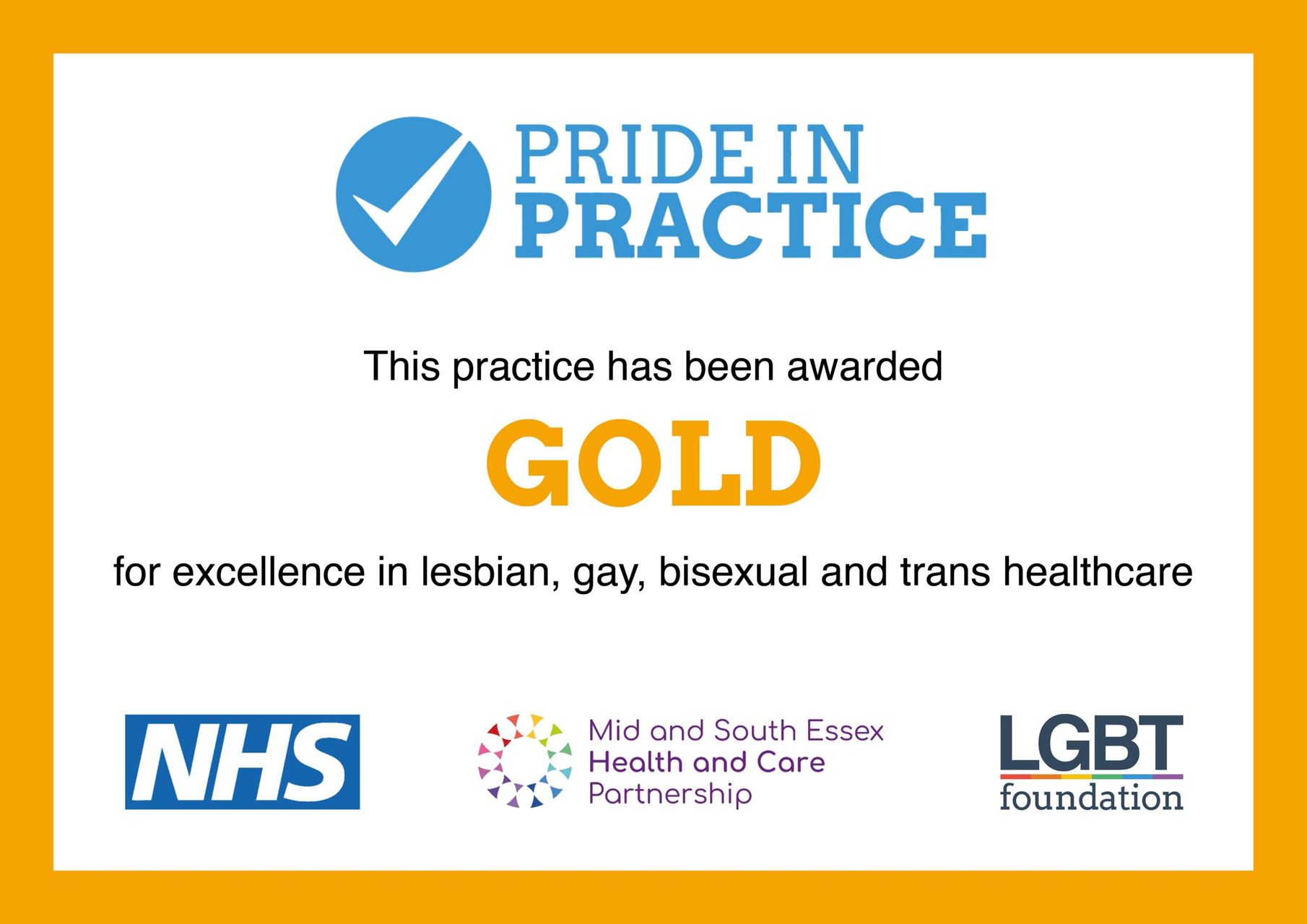Pride In Practice (LGBTQ+)
Chelmer Medical Partnership works with LGBT Foundation’s Pride in Practice to ensure we achieve excellence in LGBT healthcare and successfully meet the needs of our LGBT patients and have been awarded GOLD.
We are here to listen to suggestions and feedback from our LGBT patients on their experiences with us. What are we doing well? How can we continue to develop? Please let us know.
We’re proud to have you as our patient.
Our Patient Participation Group is open to all and dedicated to protecting diversity and equality. We are here to listen to suggestions and feedback from our LGBT patients on their experiences with us. What are we doing well? How can we continue to develop? We are hoping that by listening we can better improve and move towards a more equal healthcare provision.
If you have something you want to share or feel would help us in this process, please join the PPG.

Gender Recognition Act 2004
The 2004 Gender Recognition Act (GRA) makes it a criminal offence to disclose an individual’s transgender history to a third party without their written consent if that individual holds a Gender Recognition Certificate (GRC).
Patients do not need to show a GRC or birth certificate in order for the GRA 2004 to be in effect, so it is best practice to act as though every trans patient has one. This means always obtaining a trans patient’s written consent before sharing details about their social or medical transition, sometimes also called gender reassignment, with other services or individuals. This includes information such as whether a patient is currently taking hormones or whether they have had any genital surgery, as well as information about previous names or the gender they were given at birth.
Consent should always be obtained before information relating to the patient being trans is shared in referrals and this information should only be shared where it is clinically relevant, e.g., it would be appropriate when referring a trans man for a pelvic ultrasound but not when referring him to ENT.
LGBT Support Services
LGBT Foundation
Website: lgbt.foundation
Telephone: 0345 3 30 30 30
The Proud Trust (Support for young trans people)
Website: www.theproudtrust.org
Galop (LGBT Domestic Abuse Helpline)
Telephone: 0800 999 5428
Terrence Higgins Trust (Support and information regarding HIV)
Website: www.tht.org.uk
For more support services please see the LGBT Signposting document..
Screening
Trans patients may not be invited to routine screenings and can miss out on important health checks.
Please ask a nurse to see if you’re due a screening and book an appointment to discuss how we can make your screening comfortable for you.
For information on screening programmes for trans and non-binary people please see the Information for trans people – NHS Screening Programmes document from Public Health England.
All patients with a cervix should have a cervical screening.
Misinformation has suggested sexual orientation affected the need for regular screening. This is not true. All patients with a cervix should attend these appointments. Trans and non-binary patients who may not receive national screening reminders are offered assistance by the practice in keeping track of when they should receive checks.
If you have not yet received this information please contact the surgery and speak with one of our LGBT Champions who will be able to set this up for you.
Training
We have undertaken training to gain a better understanding of the barriers faced by LGBT communities in accessing services. We want to ensure our team know how to support LGBT by developing inclusive practices and patient-centred care.
Our staff complete annual Equality and Diversity training and LGBTQ Awareness training.
Confidentiality Statement
We aim to provide a confidential service and respect the rights of all patients and help them access the care they need.
We do not discriminate on gender identity, marital status, pregnancy and maternity, sexual orientation, trans status, race, nationality, religion or belief, age or disability.
For information on our confidentiality statement when collecting sexual orientation, gender identity and trans status please see the document here.
Policies
Our policies are reviewed and updated on a yearly basis.
Please see the Gender Identity Toolkit and Trans Patients Policy.
Suggestions and Feedback
We welcome suggestions and feedback from our LGBT patients on their experiences with us. What are we doing well? How can we continue to develop? Please let us know.
Page created: 24 May 2023